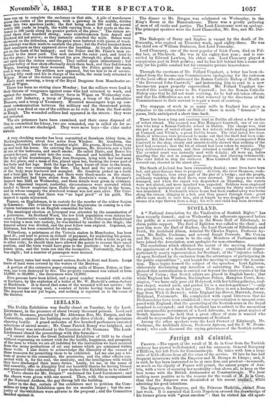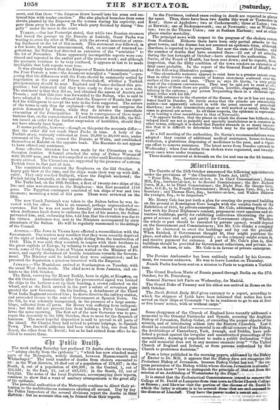iortign oti Colonial.
FRANCE.—The report of the recall of M. de la Cour from the Turkish embassy has proved well-founded ; and his successor, General Baraguay d'Hilliers, has left Paris for Constantinople. He takes with him a large suite of field-officers from all the arms of the service. Of late he has had frequent interviews with the Emperor and M. Drouyn de Lhuya ; and, it is said, he has been instructed to be at once firm and prudent—to consult, as much as the dignity of France will permit, the amour propre of Aus- tria, with a view of securing her neutrality—but above all, to keep on the best terms with the British Ambassador at Constantinople. Ws hear nothing more positive as to the reasons for the recall of gopla cour, than that the Emperor was dissatisfied at his recent conetck.cc *bile
admitting his good intentions. ,.
The Emperor, the Empress, and the Princess Mathilde, ;visited Ham last week. It is narrated that Louis Napoleon crossed the, drawbridge of his former prison with "great emotion " : that he visited,,kis old apart- ment, and that there "the Empress threw herself into his arms and em- braced him with tender emotion.' She also plucked branches from some shrubs planted by the Emperor on the terrace during his captivity, and gave them away to the suite. The whole party finished by dining ` fru- gally " under the trees in the court.
TURKEY.—Our last Postscript stated, that while two Russian steamers had forced the passage up the Danube at Isaktchi, Omer Pacha was waiting to cross the river at Widin, with the avowed intention of enter- ing Bucharest on the 1st of this month. This statement was followed, in a few hours, by another announcement, that, on account of renewed ne- gotiations, the Sultan had directed an extension of the " armistice " to the 1st of November. These apparently incompatible reports were con- tinued and repeated in the earlier part of the present week ; and although the accounts continue to be very confused, it appears at last to be made intelligible that both reports were true.
It was already known that the Emperor of Russia had communicated to the Four Powers a note—the document miscalled a "manifesto "—pro- posing that his differences with the Porte should be summarily settled by negotiation in the camp of Prince Gortschakoff, whither a Turkish plenipotentiary should be sent. England and France declined this pro- position ; but intimated that they were ready to draw up a new note. The statement is that they did so, and obtained the assent of Austria and Prussia ; and that this note was forwarded to the Sultan, who is said to have adopted it. It is also affirmed that the Emperor of Russia has signi- fied his willingness to accept the note in the form suggested. The nature of the terms is only thus far explained—that they do not comprise the points demanded by Russia, while they do involve the immediate evacuation of the Principalities. It was in consequence of these nego- tiations that, on the representation of Lord Stratford de Redcliffe, the Sul- tan issued an order for the further suspension of hostilities, should they not have already been begun. It seems probable, however—though on this point the accounts differ— that the order did not reach Omer Pacha in time. A body of the Turkish army, variously estimated at from 20,000 to 30,000 men, under command of the Pacha, crossed the Danube at Widin, and established themselves at Ealafat on the opposite bank. The Russians do not appear to have offered any resistance. Some effective diversion has been made by the Circassians on the Georgian frontier. Sehamyl attacked the army of Prince Woronzoff with 20,000 men, and was not compelled to retire until Russian reinforce- ments arrived. The Circassians are supported by the presence of a strong Turkish force in that part of Asia.
The combined fleets entered the Bosphorus on the 22d October. A heavy gale blew at the time and the ships made their way up with diffi- culty. They only reached Gallipoli, where the English anchored ; the French taking Lampsaki, on the opposite shore. The Turks had, on the 20th October, a fleet of twenty-two ships of the line and nine war-steamers in the Bosphorus : this fleet mounted 1116 guns. The Egyptian contingent consisted of ten ships of war and two steamers ; mounting a total of 614 guns. These were reviewed on the 19th.
The new Greek Patriarch was taken to the Sultan before he was in- vested with his office. This is an unusual, perhaps unprecedented oc- currence. But he was not merely formally introduced to the Sultan ; when Anthemos knelt down to embrace the feet of his master, the Sultan prevented him, and, embracing him, told him that his elevation was due to his virtues. Anthemos was sent to the Ministers accompanied by sixty attendants of the Sultan. He will be regularly summoned to the sittings of the Council.
AUSTRIA.—The Jews in Vienna have effected a reconciliation with the Government. Our readers may recollect that they were recently deprived of the right of holding real estate, a right dating from the insurrection of 1848. This, it was said, they resented, in league with their brethren in the great capitals of Europe, by refusing to accept Austrian notes. Last week, some of the leading Jews at Vienna waited on the Minister of Fi- nance, and eagerly disclaimed all hostile intentions towards the Govern- ment. The Minister said be believed they were calumniated; and he procured the deputation a gracious interview with the Emperor.
JAMAICA.—The Magdalena arrived at Southampton on Tuesday, with the usual West India mails. The chief news is from Jamaica, and ex- tends to the 16th October.
The Brisk, conveying Sir Henry Barkly, hove in sight, at Kingeon, on the 4th October. Immediately after the preconcerted signal was hoisted the ships in the harbour sent up their bunting, a crowd collected on the wharf, and as the Brisk arrived in the port a salute of seventeen guns greeted the new Governor. On his landing, a detachment of the Third West India Regiment received him ; he drove direct to the railway station, and proceeded thence to the seat of Government at Spanish Town. On the 6th, be was solemnly inaugurated, in the presence of a large assem- blage, collected from all parts. Sir Henry was suffering from indisposi- tion; but that did not prevent him from holding a Privy Council and levee the same morning. The first act of the new Governor was to pro- rogue the Assembly to the 18th October, then to meet for the despatch of business. The most hopeful disposition is said to prevail in all parts of the island. Sir Charles Grey had retired to private lodgings, in Spanish Town. Two farewell addresses had been Toted to him, one from Port Royal, the other from St. David; but as ha had retired from office he de- dined to receive them.



























 Previous page
Previous page